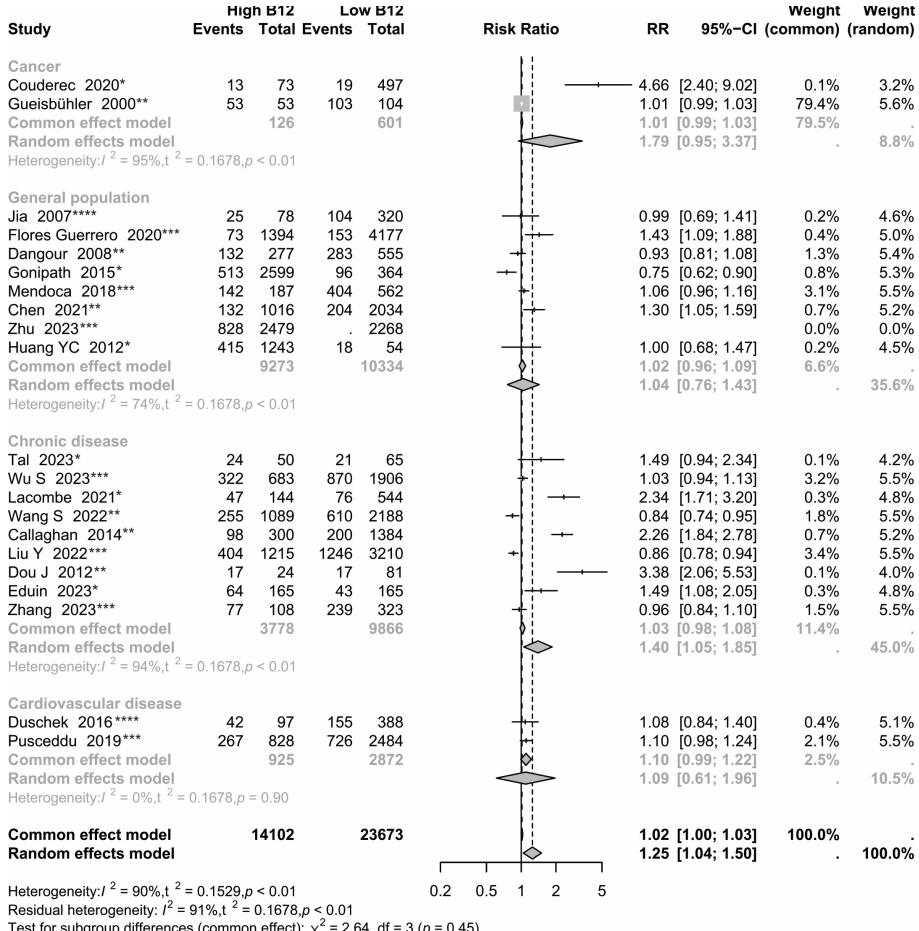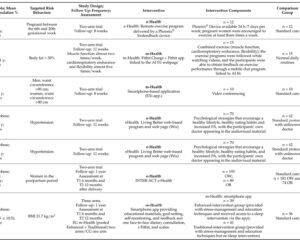Introduction
Hypervitaminosis B12 refers to abnormally high serum levels of vitamin B12 (cobalamin). Although traditionally vitamin B12 deficiency has attracted clinical attention, emerging literature has associated elevated B12 levels with increased mortality risk in specific populations. Given the vital roles of vitamin B12 in neurological function, DNA synthesis, and cellular metabolism, understanding its prognostic value is crucial. However, conflicting evidence, methodological variances, and conceptual challenges complicate interpretations. This article examines a recent systematic review and meta-analysis evaluating whether hypervitaminosis B12 serves as a reliable prognostic factor for all-cause mortality.
Study Design and Methods
The study conducted a systematic review and meta-analysis of 28 longitudinal observational studies, encompassing 69,610 adult participants with reported serum vitamin B12 levels and all-cause mortality outcomes. Studies included participants aged 18 years and above, performed in clinical or epidemiological settings. Key inclusion criteria were studies reporting adjusted hazard ratios (HRs) or relative risks (RRs) for mortality associated with high serum B12.
Information sources included PubMed, Scopus, Web of Science, Google Scholar, and ProQuest One Academic up to June 30, 2024. Data extraction followed rigorous protocols adhering to PRISMA guidelines, and study quality was assessed using the ROBINS-E framework. Statistical analyses integrated both frequentist meta-analytic models and Bayesian network meta-analyses to evaluate associations and effect sizes.
Key Findings
Across the aggregated data, 15,815 deaths were recorded. Meta-analytic results indicated that elevated serum vitamin B12 was associated with a marginal increase in all-cause mortality risk overall (RR 1.25; 95% CI 1.04 to 1.50). Subgroup analyses revealed a statistically significant increased risk in individuals with chronic diseases (RR 1.40; 95% CI 1.05 to 1.85) and hospitalized patients (RR 1.57; 95% CI 1.19 to 2.07). However, meta-regression adjusting for disease types and study setting attenuated these associations, highlighting substantial clinical and methodological heterogeneity.
Bayesian network meta-analyses corroborated trends towards higher mortality risk at elevated B12 tertiles, especially in hospitalized cohorts, but credible intervals were wide, signifying uncertainty. Notably, studies frequently measured total serum B12 at a single time point, limiting dynamic assessment of B12 fluctuation over time and possibly conflating active versus inactive forms.
Funnel plot asymmetry suggested potential publication bias, and the heterogeneity indices (I² > 80%) underscored variability in population characteristics, disease severity, and adjustment for confounders such as liver and kidney dysfunction.
Expert Commentary
These findings underscore the complex nature of interpreting high serum vitamin B12 as a prognostic marker. Elevated B12 may reflect underlying pathophysiological processes such as liver disease, malignancy, or inflammatory states rather than a direct causal contributor to mortality. Measurement of total B12 does not discriminate between active cobalamin and analogs, possibly leading to misleading elevations.
Moreover, observational studies differ in design, populations, and confounder adjustments, complicating synthesis. The conflation of prediction and causation is a key conceptual pitfall, with many studies interpreting associations causally without robust mechanistic evidence.
The meta-analysis highlights the need for rigorous prospective studies with serial B12 measurements, clearer definitions of hypervitaminosis, and integration of functional biomarkers. Understanding whether elevated B12 adds predictive value beyond established clinical factors is essential before clinical implementation.
Conclusions
Available evidence does not conclusively support hypervitaminosis B12 as an independent prognostic marker of increased all-cause mortality in adults. Associations observed, especially in chronic disease and hospital settings, may be confounded by underlying health conditions. Clinicians should interpret elevated serum B12 with caution and consider broader clinical context. Further high-quality research is warranted to clarify the biological mechanisms and prognostic utility of serum vitamin B12 levels.
References
Valdez-Martínez, E., Márquez-González, H., Ramírez-Aldana, R., & Bedolla, M. (2025). The Controversial Issue of Hypervitaminosis B12 as Prognostic Factor of Mortality: Global Lessons from a Systematic Review and Meta-Analysis. Nutrients, 17(13), 2184. https://doi.org/10.3390/nu17132184
Halczuk, K. et al. (2023). Vitamin B12—Multifaceted in vivo functions and in vitro applications. Nutrients, 15, 2734.
Mucha, P. et al. (2024). Vitamin B12 metabolism: A network of multi-protein mediated processes. International Journal of Molecular Sciences, 25, 8021.
Schwarzer, G. (2015). Meta-Analysis with R. Springer: Cham, Switzerland.
Ramspek, C.L., et al. (2021). Prediction or causality? A scoping review of their conflation within current observational research. European Journal of Epidemiology, 36, 889–898.


